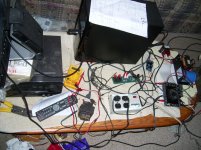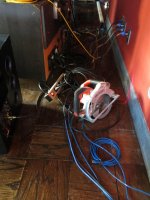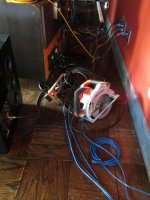Try plugging an electric drill, or other appliance that contains a motor with a commutator and brushes, into the SAME ELECTRICAL OUTLET as your stereo system. Pull the trigger on the drill.
Do you hear anything in the speakers? If so, fix the amp, preamp, or whatever is causing you to hear it.
If not, then the power cable will not matter provided it is big enough to operate the equipment without voltage drop.
This is some of the best advice i have ever heard. As soon as i read your post i grabbed a large electric drill and tried the experiment. My current system that is a refuge from a trash can worked perfectly, and i am only using 2 wire zip cord for the power cords.
Attachments
Who am I to tell a grown man how to spend HIS money. If he wants to spend $$$$ for a line cord, I'll let him. I know he spent "about $10K" for those speakers....used.
As I read your post, you were justifying your power cord beliefs and actions with the behavior of some other nameless engineers.
That means that the grown man in question is you, and you are the best person to tell you about how to spend your money.
Please do not interpret any technical analysis of this topic with someone lording it over you and trying to tell you what to do.
It is your money, your time, and please do any reasonable thing with them, including this audio woo thing.
However, you may speculate what my evaluation is of the technical expertise of people who actually swallow this sort of thing.
No evidence created or needed.
Um, tubelab quoted the statement in the post to which I replied. Your preconceptions are getting away from you.
Power cords won't matter much if you listen in a lo-fi room. 😀
So many people here (this forum, this thread) post photos of their systems in rooms that look like they have horrible acoustics. Parallel hard walls, large glass surfaces,tile, hard floors, sparse furnishing and so on.
I don't get it.
I hear you. My cheapo 6 channel class D amp $60.00 (see post above) sounds terrific because i spent $2000.00 fixing up the room acoustics.
Custom extra thick maximum pleated curtains cover the walls from the stereo to the wall were i sit. All furniture in the room is over stuffed and placed symmetrically. On the back wall were i sit, i cutout a large 8 foot wide by 5 foot tall opening into the next room to prevent reflections (live end, dead end). and of coarse carpeted floor with padding.
you were justifying your power cord beliefs and actions with the behavior of some other nameless engineers
I don't believe in any of the voodoo reasons behind any overpriced cable, and I don't buy any of them. Those ARE my beliefs. This was stated on my web site nearly 10 years ago, and remains there today. Note: some material is out of date, and I no longer build and sell amps.
However I am not going to argue with, or try to persuade otherwise, someone who wants to spend his money on those items, even if that person is a well respected electrical engineer that should know better. It IS HIS money.
Philosophy | Tubelab
I can 24K gold plate some mains cables, but it won't be cheap.... you might go blind 'cause they're SO SHiNY
!!!
!!!
A technical explanation of what this test demonstrates about power cords would be interesting. Currents, impedance, etc.; that kind of stuff. No math required, general concepts only. That they don't act as 120 Hz low pass filters?
take it to the max
Better yet, plug in a Tesla Coil on the same circuit... reductio ad absurdum
I forgot to mention, the power cords on my audio equipment come from an old computer. My speaker wire came from Walmart (12 gauge), and my interconnects came from Radio Shack (the decent ones with good connectors).
IF the equipment is properly designed, these things shouldn't matter.
Does the power cord on YOUR system matter?
Try plugging an electric drill, or other appliance that contains a motor with a commutator and brushes, into the SAME ELECTRICAL OUTLET as your stereo system. Pull the trigger on the drill.
Do you hear anything in the speakers? If so, fix the amp, preamp, or whatever is causing you to hear it.
If not, then the power cable will not matter provided it is big enough to operate the equipment without voltage drop.
Better yet, plug in a Tesla Coil on the same circuit... reductio ad absurdum
I don't believe in any of the voodoo reasons behind any overpriced cable, and I don't buy any of them.
Building high end style power cables yourself (which is what your pix then seems to show) just removes a proxy. Same difference, same message to visiting firemen.
As I read your post, you were justifying your power cord beliefs and actions with the behavior of some other nameless engineers.
That means that the grown man in question is you, and you are the best person to tell you about how to spend your money.
Please do not interpret any technical analysis of this topic with someone lording it over you and trying to tell you what to do.
It is your money, your time, and please do any reasonable thing with them, including this audio woo thing.
However, you may speculate what my evaluation is of the technical expertise of people who actually swallow this sort of thing.
Arny, I think you are practising double blind reading, ever got the wrong end of the stick?
However I am not going to argue with, or try to persuade otherwise, someone who wants to spend his money on those items, even if that person is a well respected electrical engineer that should know better. It IS HIS money.
FACT: The money is better spent as a charitable donation.
Don't worry, it's just the usual assumption laden hair trigger straw man response.ever got the wrong end of the stick?
I clicked on the links in his signature and saw this. http://s22.postimg.org/cbuugxsf5/P1070765.pngI looked at the pictures of 50AE's system
I was wondering, if the claimed effects of boutique power cords do exist, wouldn't that particular arrangement negate it by having ordinary wires (black and orange color) after the terminal?
Building high end style power cables yourself
Doesn't happen.
Arny, I think you are practising double blind reading
Either that, or he is trying to pi$$ me off. I bit on this once, no more.
A technical explanation of what this test demonstrates about power cords would be interesting
This test demonstrates nothing about power cords. It will however find SOME, not ALL amps that have poor immunity to line coupled noise. If your amp is blind enough to a purposeful dose of noise that is predominately in the audio range, then the minute amount of protection that could allegedly be offered by a magic power cord should have no audible effect on line noise of a much lower magnitude, and often out of the audio band.
I use this test, and several others on every amplifier I make to find problems early.
Granted this is not a controlled test, my drill is not the same as your drill, and the amount of coupling to the power line depends on the resistance (and inductance) between the point that the amp and drill meet, and the AC source. Add a coiled up extension cord to increase the noise.
I could describe a simple test fixture I made for inserting a quantifiable amount of line noise on the power line, or alternator whine on a 12 volt supply, and describe the testing we did, but I know where that will go.
I clicked on the links in his signature and saw this. http://s22.postimg.org/cbuugxsf5/P1070765.png
I was wondering, if the claimed effects of boutique power cords do exist, wouldn't that particular arrangement negate it by having ordinary wires (black and orange color) after the terminal?
A very similar situation applies to most high end speaker cables. While there are speakers with high end speaker wire inside, they are IME very much in the minority. Doesn't keep people from using high end cable and claiming dramatic improvements in SQ. And of course, most equipment has ordinary power wiring inside.
Last edited:
This test demonstrates nothing about power cords. It will however find SOME, not ALL amps that have poor immunity to line coupled noise.
And it sounds like a perfectly suitable and reasonable test. I have a 42" Panasonic plasma that works gangbusters revealing toroid susceptibility to asymmetry on power lines.
 pulled a lot of posts dealing with personalities......
pulled a lot of posts dealing with personalities......cables have been discussed in the blowtorch threads
as well and in a lot of other threads, and there results were very predictable...degenerated into a ******* match....
so if you have nothing better to say, then don't.....
i promise to close this thread s rules are constantly ignored...
- Status
- Not open for further replies.
- Home
- Member Areas
- The Lounge
- Power cord lilly gilding.


